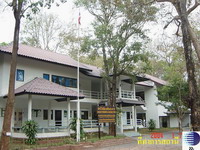

 |
SERS HISTORY Sakaerat Environmental Research Station (SERS) occupies an important location within Thailand 's diverse natural landscape. It has become a focal point for scientific research, conservation training and teaching, and local-community involvement. In recent years, SERS has also developed into a highly sought-after eco-tourism site. SERS was established on September 19, 1967 by the Thai government. Forest land for the station was donated as a forest reserve for scientific purposes by the Royal Forestry Department and Ministry of Agriculture. It was to be administered by the Thailand Institute of Scientific and Technological Research (TISTR, or the Applied Scientific Research Corporation of Thailand , ASRCT, as it was then known). Between 1968 and 1972, SERS was the setting for Project TREND (Tropical Environmental Data). It was a multidisciplinary study of the environment and ecology of a tropical zone. The project was conducted by ASRCT, technically supported by the U.S. Army Natick Laboratories and with the cooperation of a number of U.S. and Thai Government agencies. In 1974, the Thai government approved the continuation of funding and management of SERS by TISTR for ecological and environmental research. This decision culminated with SERS being accepted as one of UNESCO's chain of biosphere reserves, in the ‘Man and Biosphere Programme' (MAB) in 1977. MAB was officially launched by UNESCO in 1970. This network of protected reserves is samples of the world's major ecosystem types, which are devoted to conservation of nature and scientific research. They provide a standard against which man's impact on the environment can be measured. SERS was selected as the Thailand MAB site because it offered the unique opportunity to understand the characteristics of a dry-evergreen forest, a dry-dipterocarp forest and the changes which people have imposed on the natural ecosystems. A reforestation programme was initiated in 1982 that ran for ten years, to replant the extensive areas of disturbed grassland. Presently, reforestation efforts are maintained, with a focus on using native plants in the remaining patches of grassland. In 1982-83, the remaining farmers and their families living within the station boundaries were resettled to the newly established agricultural village of Wang Nam Khieo . The resettlement has been a successful one for the station's forest with a subsequent decrease in illegal harvesting and logging. Two community-based projects have been in place since 2003. They are intended to further reduce the illegal harvesting of mushrooms and edible plants. Farmers are supplied with seedlings of edible plants with high commercial value, like Parkia sp. for them to grow on their own land. In addition, farmers are being encouraged to start their own mushroom farms or belong to a community farm, with spores supplied from SERS. Demonstration mushroom farms are located on the station and at a local school. Since its inception as a research station, SERS has hosted a large number of research projects on a wide array of topics. While the majority of projects are conducted by Thai people, a number of foreign researchers have used the station for their work. In addition, universities from around Thailand including Khorat, Bangkok , Khon Kaen and Songkla bring students to the station on field-trips for training in biological and ecology studies. In recent years, SERS has expanded its role in the region, while maintaining its dedication to the support of research and stressing the importance of conservation. SERS hosts science camps for school groups, maintains conference and meeting facilities and has a programme of team-building activities centred on the forest. In addition, SERS organizes and hosts scholarship camps for local underprivileged children. These are supported by donations of food and money by local businesses. It has also developed into a small-scale eco-tourism attraction. The ability of SERS and its staff to maintain a strong focus on conservation and the well-being of the forest, was recognized by the Thailand Tourism Authority when it awarded SERS the ‘Outstanding Performance for a Tourist Attraction', in the Eco-Tourism section of the Thailand Tourism Awards, 2006.
|